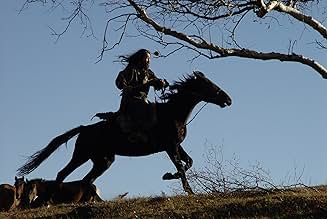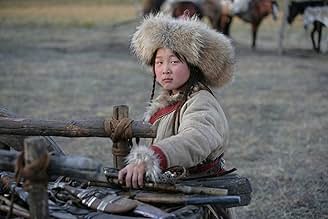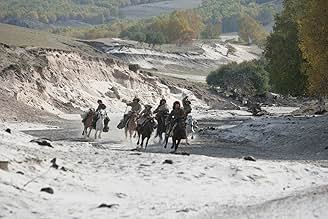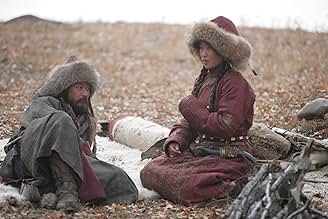IMDb-BEWERTUNG
7,2/10
50.721
IHRE BEWERTUNG
Die Geschichte erzählt das frühe Leben von Genghis Khan, der ein Sklave war, bevor er 1206 die halbe Welt eroberte.Die Geschichte erzählt das frühe Leben von Genghis Khan, der ein Sklave war, bevor er 1206 die halbe Welt eroberte.Die Geschichte erzählt das frühe Leben von Genghis Khan, der ein Sklave war, bevor er 1206 die halbe Welt eroberte.
- Regie
- Drehbuch
- Hauptbesetzung
- Für 1 Oscar nominiert
- 16 Gewinne & 13 Nominierungen insgesamt
Liya Ai
- Oelun - Temudjin's Mother
- (as Aliya)
Baasanjav Mijid
- Esugei - Temudjin's Father
- (as Ba Sen)
Ayuur
- Sorgan-Shira
- (as A You Er)
Huntun Batu
- Altan
- (as Hong Jong Ba Tu)
Deng Ba Te Er
- Daritai
- (as E Er Deng Ba Te Er)
Su Ya La Su Rong
- Girkhai
- (as Su You Le Si Ren)
Empfohlene Bewertungen
'Mongol,' the Russian-directed semi-historical epic (big emphasis on the semi- here) shot for $20 million in China (and Mongolia and Kazhakistan) with a multi-national cast and crew and Japanese and Chinese stars, purports to depict the first thirty-five years of the life of the emperor Genghis Khan. I say "purports," because not much is known of this period and even in depicting legend, Bodrov chooses to leave out many of the essential connectives that make a good story (or fairy tale or legend). Temudjin, as the young super-Khan is called, is a yoked prisoner, for example, awaiting execution; then, inexplicably, the yoke is off and he's free. He sinks through thin ice deep into the frozen water below; then, inexplicably, he's lying on land and getting rescued. He is languishing in a Chinese prison--his face seeming to acquire a patina of dust and sand (I liked that part: Bodrov excels at faces and tableaux); then he's miraculously found by his faithful wife Borte. She throws him a key and sets him free. Then, inexplicably, he is leading a vast army to defeat his arch rival. Over and over, how we get from point A to point B is left on the cutting-room floor. This is enjoyable as spectacle but unsatisfying from other standpoints.
How Genghis Khan got to be Genghis Khan, in short, is one thing this movie doesn't begin to try to explain. Could anyone? That I don't know; but 'Mongol' presents its biographical narrative without the connectives that make sense of a life. Despite lots of dramatic scenes with snappy dialog, striking images, and above all computer-assisted battles with crunching bones and crackling arrows and ringing swords, the film has an epic style without epic themes because its great issues are not so much resolved as abruptly, magically removed. This may in fact be more an epic love story than anything else. It is that in the backhanded way the 'Odyssey' is a love story, because, though Temudjin is away from Borte a lot of the time as Odysseus is mostly away from Ithaka and Penelope, 'Mongol's' opening sequence gives Borte a primary importance, because she (as played by Bayertsetseg Erdenebat), belonging to another tribe, a liberated young woman of the twelfth century, isn't chosen by but chooses Temudjin when he's nine years old and she's ten. It's not supposed to be that way--and maybe it wasn't; it seems a bit implausible. Temudjin is traveling with his Khan (tribal chieftain) father (Ba Sen) on their way to placate another tribe by choosing the boy's wife from their girls. When they don't, the father is promptly poisoned by the other tribe. And its leader, Targutai (Amadu Mamadakov), vows to kill Temudjin--but not for a year or so, because "Mongols don't kill children."
Well, what Mongols do or don't do seems up for grabs, and probably at the time, historically, "Mongol" itself must have been a rather vague concept. In fact that is another running theme: what's a Mongol? What are their primary values? There is no satisfactory answer, though killing and stealing are advanced as major concepts.
Surprisingly, since not too many are "to the right of Genghis Khan," and since he succeeds in wiping out all his enemies, Temudjin as played (as an adult) by the imposing Tadanobu Asano is a gentle-faced, zen-like fellow who's a strong advocate of fair play. Tadanobu, along with the somewhat over-histrionic Chinese actor Honglai Sun as Jamukha, his childhood blood brother and eventual arch rival, are both impressive. But the real star, with some substantial help from computer-generated effects, is the vast landscape of steppe, snow, mountain, and sky that dominates many scenes. With effective use of lenses and light, the filmmakers have created an epic look, and it's this, plus the authoritative acting, that make this film worth viewing--but only if you like this kind of thing and if you don't mind that you're not going to emerge from it with any historical knowledge. Said to be the first of a trilogy. One will approach the sequels with a certain reserve.
Shown as part of the San Francisco International Film Festival April-May 2008 and in US theatrical release June 2008.
How Genghis Khan got to be Genghis Khan, in short, is one thing this movie doesn't begin to try to explain. Could anyone? That I don't know; but 'Mongol' presents its biographical narrative without the connectives that make sense of a life. Despite lots of dramatic scenes with snappy dialog, striking images, and above all computer-assisted battles with crunching bones and crackling arrows and ringing swords, the film has an epic style without epic themes because its great issues are not so much resolved as abruptly, magically removed. This may in fact be more an epic love story than anything else. It is that in the backhanded way the 'Odyssey' is a love story, because, though Temudjin is away from Borte a lot of the time as Odysseus is mostly away from Ithaka and Penelope, 'Mongol's' opening sequence gives Borte a primary importance, because she (as played by Bayertsetseg Erdenebat), belonging to another tribe, a liberated young woman of the twelfth century, isn't chosen by but chooses Temudjin when he's nine years old and she's ten. It's not supposed to be that way--and maybe it wasn't; it seems a bit implausible. Temudjin is traveling with his Khan (tribal chieftain) father (Ba Sen) on their way to placate another tribe by choosing the boy's wife from their girls. When they don't, the father is promptly poisoned by the other tribe. And its leader, Targutai (Amadu Mamadakov), vows to kill Temudjin--but not for a year or so, because "Mongols don't kill children."
Well, what Mongols do or don't do seems up for grabs, and probably at the time, historically, "Mongol" itself must have been a rather vague concept. In fact that is another running theme: what's a Mongol? What are their primary values? There is no satisfactory answer, though killing and stealing are advanced as major concepts.
Surprisingly, since not too many are "to the right of Genghis Khan," and since he succeeds in wiping out all his enemies, Temudjin as played (as an adult) by the imposing Tadanobu Asano is a gentle-faced, zen-like fellow who's a strong advocate of fair play. Tadanobu, along with the somewhat over-histrionic Chinese actor Honglai Sun as Jamukha, his childhood blood brother and eventual arch rival, are both impressive. But the real star, with some substantial help from computer-generated effects, is the vast landscape of steppe, snow, mountain, and sky that dominates many scenes. With effective use of lenses and light, the filmmakers have created an epic look, and it's this, plus the authoritative acting, that make this film worth viewing--but only if you like this kind of thing and if you don't mind that you're not going to emerge from it with any historical knowledge. Said to be the first of a trilogy. One will approach the sequels with a certain reserve.
Shown as part of the San Francisco International Film Festival April-May 2008 and in US theatrical release June 2008.
Saw this flick last night and I really loved it. As I understand it many Mongolians hate the film for historical inaccuracies and a heavily accented cast (the lead is from Japan) but if you are unfamiliar with the area and culture you'll find a great story that brings a new light to a historical figure that a surprisingly large portion of the world reviles.
The cinematography is gorgeous and the subtitle script is excellent.
What really makes this film great are the performances and the action scenes.
When he gains followers and unites Mongolia you understand why.
Hopefully the film will get people to read more about the original man and discover the historical inaccuracies.
Of course as historical accuracies go it much more accurate then Elizabeth: The Golden Age.
The cinematography is gorgeous and the subtitle script is excellent.
What really makes this film great are the performances and the action scenes.
When he gains followers and unites Mongolia you understand why.
Hopefully the film will get people to read more about the original man and discover the historical inaccuracies.
Of course as historical accuracies go it much more accurate then Elizabeth: The Golden Age.
The most pleasing part of this film, I thought, was the excellent cinematography. Kudos to Roger Stoffers and Sergei Trofimov for an outstanding job photographing this movie, making the most bleak of landscapes look stunning many times and adding some wonderful closeup shots of objects and faces.
It's not a bad story, either, although not one that will keep you riveted to the screen for the full two hours. However, I wasn't bored, either, although some of the action scenes looked too repetitive with very hokey-looking special-effects concerning blood splashing out of people in the battle scenes. It did not look real, but as if it were drawn. It's ironic in that the production values seem to be so high with a such a nicely-filmed effort, yet the action scenes are staged like a B-movie.
In a nutshell, this is the story of how "Genghis Kahn," who is "Temudjin" throughout the movie, spent his tough early life and how he became the famous warrior. We just see how many hardships the man endured to become who he was later in life. He was never referred to as Genghis Kahn which, I learned hear, is a title more than a name. That must have come later, after he had control of all the Mongol armies, which is where the film ends.
Many times, it's a not a pleasant existence for "Temudjin," who was marked man from the age of nine. We see him spend many lonely hours held captive in different places. The looks on his face are memorable. Odnyam Odsuren ad the young "Temudjin" and Tadanobu Asano as the adult "Temudjin" both had extraordinarily photographic faces.
One of the few problems I had with the movie were understanding "the rest of the story" as certain scenes ended abruptly leaving me (and I assume other viewers) wondering "what happened?" His friends, though, were fun to watch and his bride was a beautiful, kind and strong woman, as pictured in this movie. Actually, I found this just as much of a love story as a war epic, and the romance angle was far more dramatic. The devotion the lead male and female had to each other, and the faithfulness and loyalty were inspiring, to say the least.
It's not a bad story, either, although not one that will keep you riveted to the screen for the full two hours. However, I wasn't bored, either, although some of the action scenes looked too repetitive with very hokey-looking special-effects concerning blood splashing out of people in the battle scenes. It did not look real, but as if it were drawn. It's ironic in that the production values seem to be so high with a such a nicely-filmed effort, yet the action scenes are staged like a B-movie.
In a nutshell, this is the story of how "Genghis Kahn," who is "Temudjin" throughout the movie, spent his tough early life and how he became the famous warrior. We just see how many hardships the man endured to become who he was later in life. He was never referred to as Genghis Kahn which, I learned hear, is a title more than a name. That must have come later, after he had control of all the Mongol armies, which is where the film ends.
Many times, it's a not a pleasant existence for "Temudjin," who was marked man from the age of nine. We see him spend many lonely hours held captive in different places. The looks on his face are memorable. Odnyam Odsuren ad the young "Temudjin" and Tadanobu Asano as the adult "Temudjin" both had extraordinarily photographic faces.
One of the few problems I had with the movie were understanding "the rest of the story" as certain scenes ended abruptly leaving me (and I assume other viewers) wondering "what happened?" His friends, though, were fun to watch and his bride was a beautiful, kind and strong woman, as pictured in this movie. Actually, I found this just as much of a love story as a war epic, and the romance angle was far more dramatic. The devotion the lead male and female had to each other, and the faithfulness and loyalty were inspiring, to say the least.
Mongol (2007), was co-written and directed by Sergei Bodrov. It was filmed in Kazakhstan, and is in Mongolian with English subtitles. It's a biography of Ghenghis Khan, especially his rise to power. The movie quotes an old proverb: "Do not scorn a weak cub; he may become a brutal tiger." Actually, as portrayed in the film, Ghenghis Khan was hardly a weak cub, even as a young child. However, he certainly became a tiger when grown--whether brutal or just powerful is another question.
The film is more or less consistent with the Wikipedia report of Khan's life. He was captured and enslaved as a boy, but managed to escape and eventually conquer his local tribal enemies. (The movie portrays Ghenghis Khan as a young boy and then a young man. The film ends before we can see Khan's eventual consolidation of his huge empire.)
There is (literally) a cast of thousands. The movie is colorful, the battle scenes are graphic, and men, women, and horses all look great. The acting was excellent, especially that of Odnyam Odsuren as the young Ghenghis Khan, Tadanobu Asano as the grown man, and the beautiful Khulan Chuluun as Börte, his wife.
For political and/or esthetic reasons, Khan is portrayed as a man who brought the warring Mongolian tribes together, and as a lawgiver and just ruler. I don't have enough knowledge of the period to know whether the people of his empire would have taken this view. However, this is a movie, not a Ph.D. dissertation, so I accepted it as an action-filled and enjoyable--if not profound--film.
We saw this film at the excellent Rochester High Falls International Film Festival. Because of the sweeping nature of the battles, and the glorious shots of the landscape, this movie will lose a lot on DVD. Try to see it in a theater, preferably one with a large screen.
The film is more or less consistent with the Wikipedia report of Khan's life. He was captured and enslaved as a boy, but managed to escape and eventually conquer his local tribal enemies. (The movie portrays Ghenghis Khan as a young boy and then a young man. The film ends before we can see Khan's eventual consolidation of his huge empire.)
There is (literally) a cast of thousands. The movie is colorful, the battle scenes are graphic, and men, women, and horses all look great. The acting was excellent, especially that of Odnyam Odsuren as the young Ghenghis Khan, Tadanobu Asano as the grown man, and the beautiful Khulan Chuluun as Börte, his wife.
For political and/or esthetic reasons, Khan is portrayed as a man who brought the warring Mongolian tribes together, and as a lawgiver and just ruler. I don't have enough knowledge of the period to know whether the people of his empire would have taken this view. However, this is a movie, not a Ph.D. dissertation, so I accepted it as an action-filled and enjoyable--if not profound--film.
We saw this film at the excellent Rochester High Falls International Film Festival. Because of the sweeping nature of the battles, and the glorious shots of the landscape, this movie will lose a lot on DVD. Try to see it in a theater, preferably one with a large screen.
While the plot contained some dubious twists and had rather strange and slow pacing, the overall effect of this movie is stellar. The cinematography rivals, while being similar to, movies such as "Crouching Tiger, Hidden Dragon". The score was amazing. The acting was, to my English speaking eyes and ears, convincing. The few combat scenes were filmed and choreographed to great effect. I am not sure how historically accurate this movie is, but it works as an enchanting piece of cinema. Highly recommended to anyone who likes art films and historical epics. Seriously, the locations make me want to take a vacation to the steppes immediately.
Wusstest du schon
- WissenswertesDirector Sergei Bodrov and Production Designer Dashi Namdakov visited Mongolia's chief shaman in the capital city of Ulan Bator, so that they could ask permission to film a movie about Genghis Khan's life. The shaman told them that of all the people who have talked about making such a film, they were the only ones to ask his permission.
- PatzerThe Mongolian tribes, including the hordes that conquered their vast empire, rode on a very peculiar race of horses, stocky build, with relatively short legs and a large head. The horses used in the movie look like ordinary western horses
- VerbindungenFeatured in The 80th Annual Academy Awards (2008)
- SoundtracksBeginning
Composed By Tuomas Kantelinen
Performed by Hamburg Film Orchestra, The London Session Orchestra, One Orchestra, Altan Urag
© 2008 X-Filme Creative Pool GmbH.
(p) 2008 Kinofabrika GmbH & Tuomas Kantelinen Ensemble.
Top-Auswahl
Melde dich zum Bewerten an und greife auf die Watchlist für personalisierte Empfehlungen zu.
Details
- Erscheinungsdatum
- Herkunftsländer
- Sprachen
- Auch bekannt als
- Mongol: The Rise of Genghis Khan
- Drehorte
- Inner Mongolia, China(location)
- Produktionsfirmen
- Weitere beteiligte Unternehmen bei IMDbPro anzeigen
Box Office
- Budget
- 18.000.000 $ (geschätzt)
- Bruttoertrag in den USA und Kanada
- 5.705.761 $
- Eröffnungswochenende in den USA und in Kanada
- 135.326 $
- 8. Juni 2008
- Weltweiter Bruttoertrag
- 26.527.510 $
- Laufzeit
- 2 Std. 6 Min.(126 min)
- Farbe
- Sound-Mix
- Seitenverhältnis
- 2.35 : 1
Zu dieser Seite beitragen
Bearbeitung vorschlagen oder fehlenden Inhalt hinzufügen























